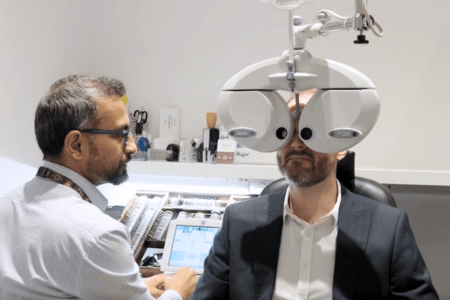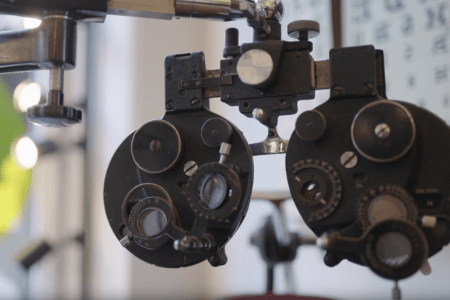
Macular Degeneration (or AMD) is a common eye condition and the primary cause of vision loss among people over 50 years of age. This condition affects the area of the retina responsible for your central vision in direct line of sight. Over time, the area of degeneration can become larger, developing blank spots, however, it does not lead to total blindness.
TYPES OF AMD
DRY AMD (The most common type of condition)
- It is often slow to develop, with gradual changes in one’s central vision – becoming blurry, blank, or distorted.
- At the final stage, dry AMD creates a blank patch in the center of one’s vision, which may interfere with daily activities such as driving, work up close and seeing faces.
- Fortunately, this leaves peripheral vision unaffected and does not lead to complete blindness, allowing a sufferer to utilise this available vision daily.
WET AMD (The less common type of condition)
- Drastic changes occur in a short time frame, sometimes causing total loss of central vision in extreme cases
- Wet AMD is caused by macula cells not working. The body generates new blood vessels, but sadly this results in swelling and bleeding, causing further damage to the macula and leading to scarring
- As a result, a blank section develops in the central area of vision. Peripheral vision is not affected, so this will not lead to complete blindness
CAUSES OF MACULAR DEGENERATION
The exact cause of developing AMD is unknown, although there are a number of factors thought to increase your risk:
- Age – commonly seen in people over 65 years of age, yet it can develop earlier
- Smoking – significantly increases your risk of developing AMD
- Family history/genetics and Race – AMD is more common among Caucasians
- Gender – more prevalent in women than men
- Sunlight – excessive exposure to the UV light in sunlight during your life potentially increases your risk of developing AMD. Eye care professionals suggest wearing sunglasses to protect your eyes
- Nutrition – evidence suggests vitamins A, C and E and zinc contribute to reducing the progression of AMD
DETECTION AND TREATMENT OF MACULAR DEGENERATION
The early and intermediate stages of AMD usually start without symptoms. Only a comprehensive dilated eye examination can detect AMD.
Currently, there is no available treatment for dry AMD.
Treatment for wet AMD aims to prevent new blood vessels from growing and damaging your macula. This treatment usually needs to be given quickly, before the new blood vessels cause too much damage to your macula. If the blood vessels are left to grow, the scarring and the sight loss it causes are usually permanent.
LOOK AFTER YOUR EYES
If you have any concerns about the health of your eyes, Whitby & Co. Opticians can help. Phone us on +44 20 7353 3355 to arrange an appointment. Alternatively, you can book an eye examination online.
An eye examination is a vital health check and should be part of everyone’s regular healthcare.





